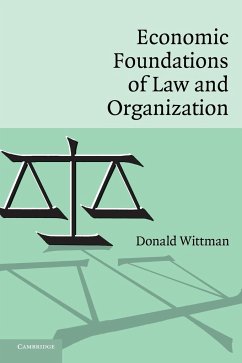Donald Wittman
Economic Foundations of Law and Organization
Donald Wittman
Economic Foundations of Law and Organization
- Gebundenes Buch
- Merkliste
- Auf die Merkliste
- Bewerten Bewerten
- Teilen
- Produkt teilen
- Produkterinnerung
- Produkterinnerung
This book serves as a compact introduction to the economic analysis of law and organization.
Andere Kunden interessierten sich auch für
![Theoretical Foundations of Law and Economics Theoretical Foundations of Law and Economics]() Mark D. White (ed.)Theoretical Foundations of Law and Economics112,99 €
Mark D. White (ed.)Theoretical Foundations of Law and Economics112,99 €![The Intellectual Foundations of Alfred Marshall's Economic Science The Intellectual Foundations of Alfred Marshall's Economic Science]() Simon J. CookThe Intellectual Foundations of Alfred Marshall's Economic Science112,99 €
Simon J. CookThe Intellectual Foundations of Alfred Marshall's Economic Science112,99 €![Psychological Foundations of Economic Behavior Psychological Foundations of Economic Behavior]() Psychological Foundations of Economic Behavior83,99 €
Psychological Foundations of Economic Behavior83,99 €![The Economic Dynamics of Law The Economic Dynamics of Law]() David M. DriesenThe Economic Dynamics of Law99,99 €
David M. DriesenThe Economic Dynamics of Law99,99 €![The Evolutionary Foundations of Economics The Evolutionary Foundations of Economics]() Kurt Dopfer (ed.)The Evolutionary Foundations of Economics166,99 €
Kurt Dopfer (ed.)The Evolutionary Foundations of Economics166,99 €![Economic Dimensions in International Law Economic Dimensions in International Law]() Economic Dimensions in International Law102,99 €
Economic Dimensions in International Law102,99 €![Foundations of Economics Foundations of Economics]() Yanis VaroufakisFoundations of Economics206,99 €
Yanis VaroufakisFoundations of Economics206,99 €-
-
-
This book serves as a compact introduction to the economic analysis of law and organization.
Hinweis: Dieser Artikel kann nur an eine deutsche Lieferadresse ausgeliefert werden.
Hinweis: Dieser Artikel kann nur an eine deutsche Lieferadresse ausgeliefert werden.
Produktdetails
- Produktdetails
- Verlag: Cambridge University Press
- Seitenzahl: 402
- Erscheinungstermin: 7. Mai 2014
- Englisch
- Abmessung: 260mm x 183mm x 26mm
- Gewicht: 948g
- ISBN-13: 9780521859172
- ISBN-10: 0521859174
- Artikelnr.: 22698249
- Herstellerkennzeichnung
- Libri GmbH
- Europaallee 1
- 36244 Bad Hersfeld
- gpsr@libri.de
- Verlag: Cambridge University Press
- Seitenzahl: 402
- Erscheinungstermin: 7. Mai 2014
- Englisch
- Abmessung: 260mm x 183mm x 26mm
- Gewicht: 948g
- ISBN-13: 9780521859172
- ISBN-10: 0521859174
- Artikelnr.: 22698249
- Herstellerkennzeichnung
- Libri GmbH
- Europaallee 1
- 36244 Bad Hersfeld
- gpsr@libri.de
Donald Wittman is Professor of Economics at the University of California, Santa Cruz. He previously taught at the University of Chicago. Professor Wittman's book The Myth of Democratic Failure (1995) won the American Political Science Association award for the best title in political economy in the years 1994-6. He is coeditor of the forthcoming Oxford Handbook of Political Economy. Professor Wittman's research has appeared in journals such as the American Economic Review, Journal of Political Economy, American Political Science Review, Journal of Economic Theory, Journal of Legal Studies, Journal of Law and Economics, and Journal of Public Economics. His research has been supported by various National Science Foundation programs.
1. Introduction
Part I. Economic Fundamentals - Rationality and Efficiency: 2. Rational behavior, preferences and prices
3. Pareto optimally versus utilitarianism
4. Cost-benefit analysis
Part II. Transaction Costs and the Coasean Revolution: 5. Transaction costs
6. Fencing in and fencing out
7. Coase versus Pigou
Part III. Cost-Benefit Analysis and the Law: 8. How to think like an economist: two hawks and a fence
9. Smoking regulations: market solutions
10. Rules of thumb: sports and driving rules
Part IV. Rights: 11. The protection of entitlements
12. Property rights or communal rights in knowledge?
13. Liability for harm or restitution for benefit
14. Takings: should there be compensation for regulation
Part V. Torts and Crimes: Liability Rules and Punishments: 15. Cost minimization and the role of liability rules
16. Negligence rules
17. Crime and criminal law
Part VI. The Role of Sequence: 18. Mitigation of damages and last clear chance
19. The Good Samaritan rule
20. The role of being first in allocating entitlements
Part VII. Contracts and Breach of Contract: 21. Default rules and breach of contract
22. When is a handshake a contract and when is a contract not a contract
23. Marriage as contract: family law
Part VIII. Harms Arising Between Contracting Parties: 24. Exploding coke bottles
25. The role of asymmetric information
26. Consumers and producers cause damage: lawnmowers
Part IX. Insurance and the Law: 27. The market for insurance
28. Royalties for artists and insurance for investors
29. Regulating automobile insurance
30. Bankruptcy
31. Deposit insurance and banking crises
Part X. Governance and Organization: 32. The governance of organization
33. Corporate law and agency problems
34. Insider trading
35. Organizational response to opportunism
36. The organization of legislatures
37. Federalism
38. The internal organization of the family
Part XI. Bargaining in the Shadow of a Trial: 39. Settlement of cases
Table of cases.
Part I. Economic Fundamentals - Rationality and Efficiency: 2. Rational behavior, preferences and prices
3. Pareto optimally versus utilitarianism
4. Cost-benefit analysis
Part II. Transaction Costs and the Coasean Revolution: 5. Transaction costs
6. Fencing in and fencing out
7. Coase versus Pigou
Part III. Cost-Benefit Analysis and the Law: 8. How to think like an economist: two hawks and a fence
9. Smoking regulations: market solutions
10. Rules of thumb: sports and driving rules
Part IV. Rights: 11. The protection of entitlements
12. Property rights or communal rights in knowledge?
13. Liability for harm or restitution for benefit
14. Takings: should there be compensation for regulation
Part V. Torts and Crimes: Liability Rules and Punishments: 15. Cost minimization and the role of liability rules
16. Negligence rules
17. Crime and criminal law
Part VI. The Role of Sequence: 18. Mitigation of damages and last clear chance
19. The Good Samaritan rule
20. The role of being first in allocating entitlements
Part VII. Contracts and Breach of Contract: 21. Default rules and breach of contract
22. When is a handshake a contract and when is a contract not a contract
23. Marriage as contract: family law
Part VIII. Harms Arising Between Contracting Parties: 24. Exploding coke bottles
25. The role of asymmetric information
26. Consumers and producers cause damage: lawnmowers
Part IX. Insurance and the Law: 27. The market for insurance
28. Royalties for artists and insurance for investors
29. Regulating automobile insurance
30. Bankruptcy
31. Deposit insurance and banking crises
Part X. Governance and Organization: 32. The governance of organization
33. Corporate law and agency problems
34. Insider trading
35. Organizational response to opportunism
36. The organization of legislatures
37. Federalism
38. The internal organization of the family
Part XI. Bargaining in the Shadow of a Trial: 39. Settlement of cases
Table of cases.
1. Introduction
Part I. Economic Fundamentals - Rationality and Efficiency: 2. Rational behavior, preferences and prices
3. Pareto optimally versus utilitarianism
4. Cost-benefit analysis
Part II. Transaction Costs and the Coasean Revolution: 5. Transaction costs
6. Fencing in and fencing out
7. Coase versus Pigou
Part III. Cost-Benefit Analysis and the Law: 8. How to think like an economist: two hawks and a fence
9. Smoking regulations: market solutions
10. Rules of thumb: sports and driving rules
Part IV. Rights: 11. The protection of entitlements
12. Property rights or communal rights in knowledge?
13. Liability for harm or restitution for benefit
14. Takings: should there be compensation for regulation
Part V. Torts and Crimes: Liability Rules and Punishments: 15. Cost minimization and the role of liability rules
16. Negligence rules
17. Crime and criminal law
Part VI. The Role of Sequence: 18. Mitigation of damages and last clear chance
19. The Good Samaritan rule
20. The role of being first in allocating entitlements
Part VII. Contracts and Breach of Contract: 21. Default rules and breach of contract
22. When is a handshake a contract and when is a contract not a contract
23. Marriage as contract: family law
Part VIII. Harms Arising Between Contracting Parties: 24. Exploding coke bottles
25. The role of asymmetric information
26. Consumers and producers cause damage: lawnmowers
Part IX. Insurance and the Law: 27. The market for insurance
28. Royalties for artists and insurance for investors
29. Regulating automobile insurance
30. Bankruptcy
31. Deposit insurance and banking crises
Part X. Governance and Organization: 32. The governance of organization
33. Corporate law and agency problems
34. Insider trading
35. Organizational response to opportunism
36. The organization of legislatures
37. Federalism
38. The internal organization of the family
Part XI. Bargaining in the Shadow of a Trial: 39. Settlement of cases
Table of cases.
Part I. Economic Fundamentals - Rationality and Efficiency: 2. Rational behavior, preferences and prices
3. Pareto optimally versus utilitarianism
4. Cost-benefit analysis
Part II. Transaction Costs and the Coasean Revolution: 5. Transaction costs
6. Fencing in and fencing out
7. Coase versus Pigou
Part III. Cost-Benefit Analysis and the Law: 8. How to think like an economist: two hawks and a fence
9. Smoking regulations: market solutions
10. Rules of thumb: sports and driving rules
Part IV. Rights: 11. The protection of entitlements
12. Property rights or communal rights in knowledge?
13. Liability for harm or restitution for benefit
14. Takings: should there be compensation for regulation
Part V. Torts and Crimes: Liability Rules and Punishments: 15. Cost minimization and the role of liability rules
16. Negligence rules
17. Crime and criminal law
Part VI. The Role of Sequence: 18. Mitigation of damages and last clear chance
19. The Good Samaritan rule
20. The role of being first in allocating entitlements
Part VII. Contracts and Breach of Contract: 21. Default rules and breach of contract
22. When is a handshake a contract and when is a contract not a contract
23. Marriage as contract: family law
Part VIII. Harms Arising Between Contracting Parties: 24. Exploding coke bottles
25. The role of asymmetric information
26. Consumers and producers cause damage: lawnmowers
Part IX. Insurance and the Law: 27. The market for insurance
28. Royalties for artists and insurance for investors
29. Regulating automobile insurance
30. Bankruptcy
31. Deposit insurance and banking crises
Part X. Governance and Organization: 32. The governance of organization
33. Corporate law and agency problems
34. Insider trading
35. Organizational response to opportunism
36. The organization of legislatures
37. Federalism
38. The internal organization of the family
Part XI. Bargaining in the Shadow of a Trial: 39. Settlement of cases
Table of cases.








